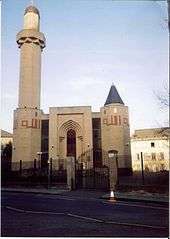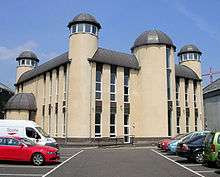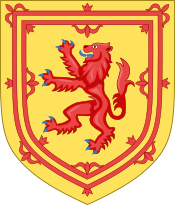Islam in Scotland
Islam in Scotland includes all aspects of the Islamic faith in Scotland. The first Muslim known to have been in Scotland was a medical student who studied at the University of Edinburgh from 1858 to 1859. The production of goods and Glasgow's busy port meant that many lascars were employed there.[1] Most Muslims in Scotland are members of families that immigrated in the later decades of the 20th century. At the 2011 census, Muslims comprised 1.4 per cent of Scotland's population (76,737).[2]
History
The first named Muslim known in Scotland was Wazir Beg from Bombay (now "Mumbai"). He is recorded as being a medical student who studied at the University of Edinburgh in 1858 and 1859.[1] Manufacturing and Glasgow's busy seaport meant that many Lascars were employed there. Dundee was at the peak of importing jute, and sailors from Bengal were also seen at its port. Records from the Glasgow Sailors' Home show that nearly a third (5,500) of the boarders in 1903 were Muslim Lascars.
However, the immigration of Muslims to Scotland is a relatively recent event. The majority of Scottish Muslims are members of families who immigrated in the late 20th century. Scotland's Muslims in 2001 represented just 0.9% of the population (42,557),[3] with 30,000 in Glasgow.[4] By 2011, the Muslim population had increased to 76,737, accounting for 1.4% of Scotland's population.[5]
Demographics
Muslims in Scotland are an ethnically diverse population. Although a majority of Muslims are of Pakistani (58%) origin, 9.8% are Arab, 7.8% are White European and 7% are African. Glasgow has the highest Muslim population of any city in Scotland with 5% of residents identifying as Muslim in the 2011 census. Pollokshields and Southside Central are the wards with the highest concentration of Muslim residents – 27.8% and 15.7% respectively. 37.3% of Muslim in Scotland were born in Scotland, with another 7.3% born elsewhere in the United Kingdom.[2]
Identity
According to information from the 2011 Scottish census, 71% of Muslims in Scotland consider their only national identity to be Scottish or British (or any combination of UK identities). The census concluded "Muslims have a strong sense of belonging to Scotland in particular and the UK more generally."[2]
Education and employment
In 2011, 37.5% of Scottish Muslims held degree level qualifications compared to the Scotland average of 27.1%. 21.4% of Muslims in Scotland had no qualifications, slightly lower than the 22.9% average for Scotland. Only 4.5% of Muslims in Scotland had poor English language skills.[2]
Muslims in Scotland in 2011 were less likely to be employed full-time (31%) than the general population (51%). Contributing factors for this include Muslims being more likely to be students (19%) than the general population (6%), and 25% of Muslim women 'looking after the home or family', in comparison to 5.6% of women from the overall population.[2] 8.7% of Scottish Muslims were unemployed, whereas 6.3% of the general population were unemployed.[2] Approximately a third of Scottish Muslims working full-time are self-employed, compared with 12% of the general population.[6]
Mosques

Some important mosques in the major cities of Scotland are Glasgow Central Mosque, Edinburgh Central Mosque, Aberdeen Mosque and Islamic Centre, and Dundee Central Mosque.
Notable Scottish Muslims
- Ali Abassi, Gaelic television presenter.
- Bashir Ahmad - first Asian Member of the Scottish Parliament (2007–09)
- Tasmina Ahmed-Sheikh - politician who served as a Member of Parliament (MP) for Ochil and South Perthshire, 2015-2017, Scottish National Party Trade and Investment spokesperson, Deputy Shadow Leader of the House in the House of Commons, and the SNP's National Women's and Equalities Convener.
- Abdal-Qadir As-Sufi (Ian Dallas)
- Bashir Mann, former Labour councillor
- Misbah Iram Ahmed Rana (Molly Campbell)
- Humza Yousaf MSP
- Dr Majid Anwar & Imran Khand - Co-founders of Picsel co. and inventors of 'swipe' and 'pinch to zoom' feature on mobile smartphones
- Mohammad Sarwar MP - First Muslim MP at Westminster from 1997 to 2010. His son Anas Sarwar held the same seat from 2010 to 2015 and has been an MSP since 2016.
- Mona Siddiqui - is a British Muslim academic, currently is a University of Edinburgh's Professor of Islam and Interreligious studies,[7] as well a regular contributor to BBC Radio 4, The Times, Scotsman, The Guardian, The Herald
- Asad Shah - Murder victim of a religiously-motivated anti-Ahmadi attack.
- Viscount Reidhaven, eldest son of the Earl of Seafield.
- Osama Saeed, chief executive of the Scottish-Islamic Foundation & Former Head of Al-Jazeera Global PR & Marketing
- Mushtaq Ahmad, lord lieutenant of Lanarkshire.
See also
- Islam by country
- Islam in the United Kingdom
- Muslim Council of Scotland
- The Muslim Weekly
- Scottish Muslims
- Demographics of Scotland
- British Asian
- Asian-Scots
- New Scots
References
- "LTSCOTLAND.ORG.UK". www.ltscotland.org.uk. Retrieved 11 April 2018.
- Elshayyal, Khadijah. "Scottish Muslims in Numbers: Understanding Scotland's Muslim population through the 2011 Census" (PDF). University of Edinburgh.
- Scottish Government, St Andrew's House (28 February 2005). "Analysis of Religion in the 2001 Census". gov.scot. Retrieved 11 April 2018.
- Young Muslims UK, accessed 4 August 2010
- "Scotland's Census 2011 – Table KS209SCb" (PDF). scotlandscensus.gov.uk. Retrieved 26 September 2013.
- Cameron, Lucinda (29 November 2016). "Study finds Muslims more likely to have a degree than other Scots,". dailyrecord.co.uk. Retrieved 11 April 2018.
- "Summit on religious harmony is thrown into discord by Malaysia". The Times. Retrieved 13 May 2010.
External links
- The Muslim Council of Scotland
- The Scottish-Islamic Foundation
- Census 2001: Key Statistics of Scotland (PDF, religion KS027)
- What is sectarianism?
- Reaching out in Edinburgh
- Last Muslim School in Scotland Faces Closure Deadline at the Wayback Machine (archived 26 September 2007), Islam Online
- "Islam misunderstood", BBC
- Scottish Left Review article on Islam in Scotland
- Scottish Pakistanis and Education



